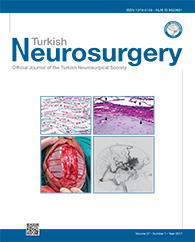2Dumlupınar University, Medical Faculty, Department of Neurosurgery, Kutahya, Turkey
3Medeniyet University, Goztepe Education and Training Hospital, Department of Pathology, Istanbul, Turkey
4Dicle University, Medical Faculty, Department of Biochemistry, Diyarbakır, Turkey DOI : 10.5137/1019-5149.JTN.14463-15.2 AIM: Ethanol causes oxidative degradation of the mitochondrial genome in the brain. This effect could contribute to the development of brain injury in some alcoholic patients. We investigated the protective effect of caffeic acid phenyl esther (CAPE) and intralipid (IL) on oxidative stress and neurotoxicity induced by ethanol intake.
MATERIAL and METHODS: The forty-eight rats were randomly divided into seven groups. Ethanol was administered for acute toxicity. IL and CAPE were administered immediately after ethanol intake. Total oxidant status (TOS), total antioxidant status (TAS), and oxidative status index (OSi) were evaluated and histologic examination of cerebellum and brain tissue with Hematoxylin-Eosin and immuno-histochemical dyes was performed.
RESULTS: In the ethanol group, TAS levels were significantly lower than the other groups and this finding indicates that the toxic effect of ethanol reduces antioxidant levels. In the ethanol group, TOS levels were significantly higher than the other groups. These results showed that ethanol induced oxidative stress. IL treatment increased TAS levels, and CAPE decreased TOS levels against ethanol toxicity. There was correlation between TAS and TOS levels. Also, histopathologic results confirmed these biochemical results.
CONCLUSION: CAPE and IL treatment could be effective course of therapy to enhance therapeutic efficacy and may provide a promising approach for the treatment of neurotoxicity and oxidative stress induced by ethanol in clinic.
Keywords : Ethanol, Caffeic acid phenyl ester, Intralipid, Neurotoxicity




